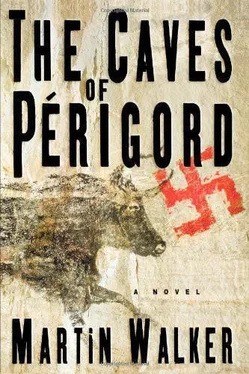Martin Walker - The Caves of Perigord
Здесь есть возможность читать онлайн «Martin Walker - The Caves of Perigord» весь текст электронной книги совершенно бесплатно (целиком полную версию без сокращений). В некоторых случаях можно слушать аудио, скачать через торрент в формате fb2 и присутствует краткое содержание. Жанр: Триллер, на английском языке. Описание произведения, (предисловие) а так же отзывы посетителей доступны на портале библиотеки ЛибКат.
- Название:The Caves of Perigord
- Автор:
- Жанр:
- Год:неизвестен
- ISBN:нет данных
- Рейтинг книги:4 / 5. Голосов: 1
-
Избранное:Добавить в избранное
- Отзывы:
-
Ваша оценка:
- 80
- 1
- 2
- 3
- 4
- 5
The Caves of Perigord: краткое содержание, описание и аннотация
Предлагаем к чтению аннотацию, описание, краткое содержание или предисловие (зависит от того, что написал сам автор книги «The Caves of Perigord»). Если вы не нашли необходимую информацию о книге — напишите в комментариях, мы постараемся отыскать её.
The Caves of Perigord — читать онлайн бесплатно полную книгу (весь текст) целиком
Ниже представлен текст книги, разбитый по страницам. Система сохранения места последней прочитанной страницы, позволяет с удобством читать онлайн бесплатно книгу «The Caves of Perigord», без необходимости каждый раз заново искать на чём Вы остановились. Поставьте закладку, и сможете в любой момент перейти на страницу, на которой закончили чтение.
Интервал:
Закладка:
“We should call you Deer Rider,” he said. “You did well.”
Deer looked at him without comprehension. Now he would have to go back to the river to wash himself clean again. He did not want Moon to see him like this.
“The old man died,” said the Keeper of the Horses. “Some beasts broke through and crushed him.”
Deer looked down. A crumpled body, pitifully small, one thin white leg twisted askew at the knee. A skin had been placed over the crushed skull. His nursemaiding days were over. Too spent to say anything, he bowed his head. He’d miss the old man.
“We will need another Keeper,” said Moon’s father. “Think of that.”
Deer lifted his head, and then shook off the man’s hand. He lurched toward what was left of the Keeper of the Bison, and lifted the skin. The eyes were open. Gently, Deer smoothed the eyelids down, and then straightened again. He looked back along the sloping stretch of ground that the beaters had covered through the dust. Grimly, he set his teeth and plodded back through the bloodied earth and between trampled young deer to find the broken brown body of the boy who had run beside him. The chest was crushed and the youth had no face. Now Deer’s tears flowed thickly. When he felt Moon’s father’s hand on his shoulder, he turned and half fell against the man’s chest, sobbing like a child as two strong and reeking arms came around him. And he felt the sticky blood on his breast and belly bind the two of them together, more closely than he had ever hoped to lie with this man’s daughter.
CHAPTER 9
Perigord, 1944
A thin frost was forming as McPhee and Manners crept along the riverbank. There were four young Frenchmen in a ragged line between them, coming along for the experience. Manners had a filthy headache, after handling the crude “808” British version of the plastic explosive. It stank and gave off pungent fumes when he had soaked it in warm water to make it malleable. But it was powerful. Less than a pound would be enough to blow the railway points apart. He had a dozen charges in his rucksack, each sewn crudely into a cloth bag.
At the rail junctions of le Buisson the east-west line to Bordeaux crossed the north-south line from Agen to Perigueux and up to Limoges and Paris. It was a small station, with a German patrol coming around four times each night to check on the small permanent guard of three of the Vichy paramilitary, the Milice. Just to establish that had taken three nights of surveillance, to the frustration of the French, who had thought the simple arrival of the Jedburgh team would trigger an instant orgy of demolitions and mayhem. They had to be taught that nine-tenths of guerrilla war was patience and observation. McPhee had two hand grenades for the Milice hut, and the Frenchmen had Stens. Francois was with another small squad about three miles back at a sharp bend in the road to Belves, the route the patrolling German lorry would take.
The night was bright with stars, but no moon. McPhee insisted on wearing his uniform, just as he insisted each day on shaving the sides of his scalp with ever-blunter razor blades. The skin above his ears was nicked with tiny cuts, but his bizarre Mohican tuft survived. Manners had taken Hilaire’s advice and was wearing dark blue French overalls and an old leather jacket. He was freezing and he was hungry, and the spring water up in the hills had given him the runs, and his head throbbed. He was about as miserable as he could ever remember being, but it was not the cold that made his hands tremble until he tucked them under the straps of his rucksack. He stepped through a thin sheen of ice and into a puddle. At least his boots were almost new.
Berger’s vaunted team of Maquis had turned out to be one tough old sergeant from the colonial army, an even older veteran of the Great War, a wiry corporal from the Alpine troops, and fourteen hungry and dispirited youths, who had taken to the hills rather than be conscripted for forced labor in German factories. Apart from one Marine deserter, only three of them had any kind of military training, and one had been a mechanic in the Air Force. They could fire a rifle, but had never fired or stripped a submachine gun, and there was no point in wasting ammunition by giving them revolvers. Berger had wanted to boost their morale with a gigantic explosion, something big like a bridge. Gently, Francois and Manners had dissuaded him. There was a limit to their stocks of explosive, and the bridges that mattered were well guarded. Better to start small, to give the best of the young Maquis a taste of action against a relatively soft target. And the coeurs d’aigulles, the points that allowed a train to switch from one line to another, were complex pieces of casting. A single destroyed stretch of rail could be repaired within a day. A network of points could take a week to replace, plus another few days to repair the signals.
Ahead of Manners, the line had stopped. McPhee signaled him to come up to the front. At least there were no hedges in this country to be pushed through or skirted. He slogged forward, ignoring the distant growling of a heavy engine. Too far away to worry about.
“That was the German patrol truck, heading back to Belves. That gives us a couple of hours before they are due back,” said McPhee. “We’re about two hundred yards from the station. You can see the railway line there on the right. I’m going to stake out the Milice hut with the sergeant. You take the boys and start laying the charges. I’ll give you thirty minutes, then I’ll put the grenades in.”
Manners waved the Frenchmen on, as McPhee and the squat little sergeant from the colonial wars began a running crouch toward the station. Manners put Frise in the lead; the one they called Curly. He at least had seen some action in 1940, in the Corps Francs, which took patrols out from the Maginot line, and felt very proud of being promoted to corporal. He had also seemed to be the fastest at grasping the basics of demolition when Francois and Manners had shown the group how the detonators worked. It was a straightforward fuse, and they all had lighters. Just so long as they remembered to stuff the charges into the V of the points.
It was a very small town, and the station was almost on the outskirts. Frise took them quickly past darkened houses, over a narrow road, and past a squat war memorial from 1914-18 until they reached the level crossing. The rails and their crucial points spread out in the starlight like a great fan. Manners opened his rucksack, gave each of the Frenchmen two charges, and pushed them toward the rails. Just as he began placing his fourth charge deep into the points, there came the sound of distant gunfire. Automatic bursts, then single shots. It wasn’t McPhee-the wrong direction. The German patrol! But they were still miles away.
“Finish your work,” he snapped at Jean-Claude, who had stood up and was staring around wildly, a charge still in his hand. The Frenchman bent again to his task. Manners had two charges still to place, and then came a flash of red light at the station fifty yards down the line, and the crack of a grenade, then the burst of a Sten as McPhee hit the Milice hut.
“Finished,” called Frise, shepherding the other young Frenchmen back to the level crossing. Manners scampered across the rails, taking out his shielded red torch to check on each charge. He had placed his own by touch alone. There was more firing from the station. Then from far up the road, the unmistakable ripping sound of a belt-fed MG-34, a German machine gun. Francois was in trouble. A distant, flat boom. Francois was using his Gammon grenades, homemade bombs that eked out their pitiful arsenal.
“O.K.” He waved them back to the rails. “Ignition now.” He had given each of them a “Tommy” lighter, more reliable than matches in wind-as long as they could get the petrol. His own sparked and flared. He had six to light, the Frenchmen only two each. He didn’t have enough fuses to link them all together to a single firing point. The fuses caught. They now had just over a minute to get clear. McPhee was on his own. Francois was on his own. The rule was that they each had to make their own withdrawal to the agreed rendezvous. Back at the level crossing, he slapped the chattering Frenchmen on the back, more to be sure they were all there than from any sense of congratulation. One, two, three.
Читать дальшеИнтервал:
Закладка:
Похожие книги на «The Caves of Perigord»
Представляем Вашему вниманию похожие книги на «The Caves of Perigord» списком для выбора. Мы отобрали схожую по названию и смыслу литературу в надежде предоставить читателям больше вариантов отыскать новые, интересные, ещё непрочитанные произведения.
Обсуждение, отзывы о книге «The Caves of Perigord» и просто собственные мнения читателей. Оставьте ваши комментарии, напишите, что Вы думаете о произведении, его смысле или главных героях. Укажите что конкретно понравилось, а что нет, и почему Вы так считаете.












